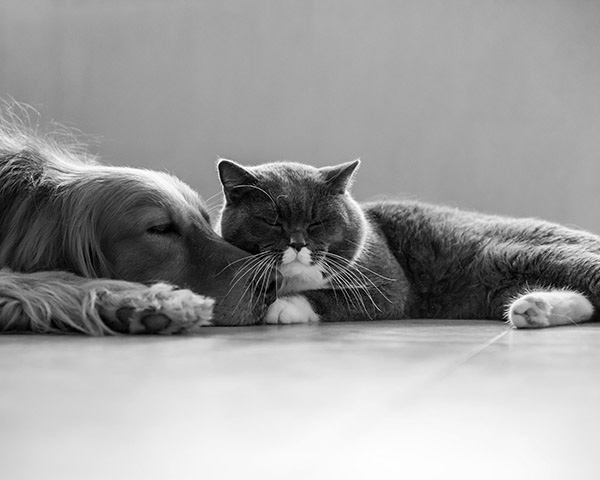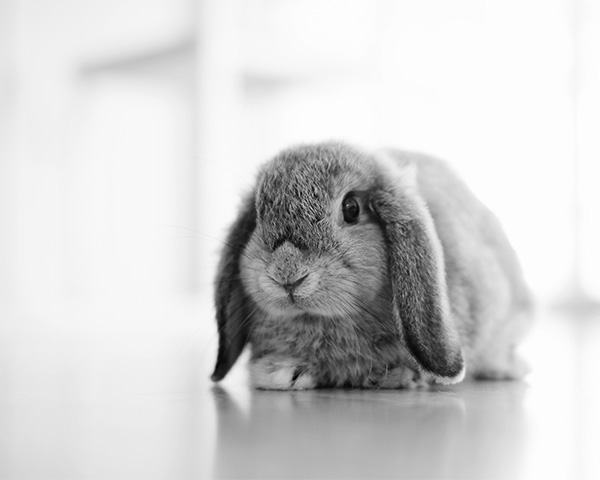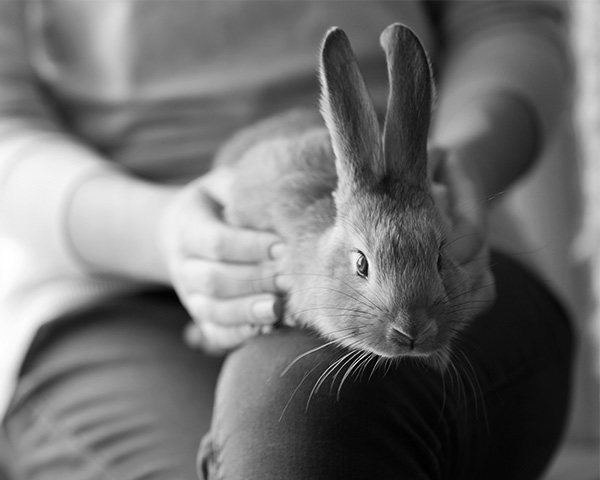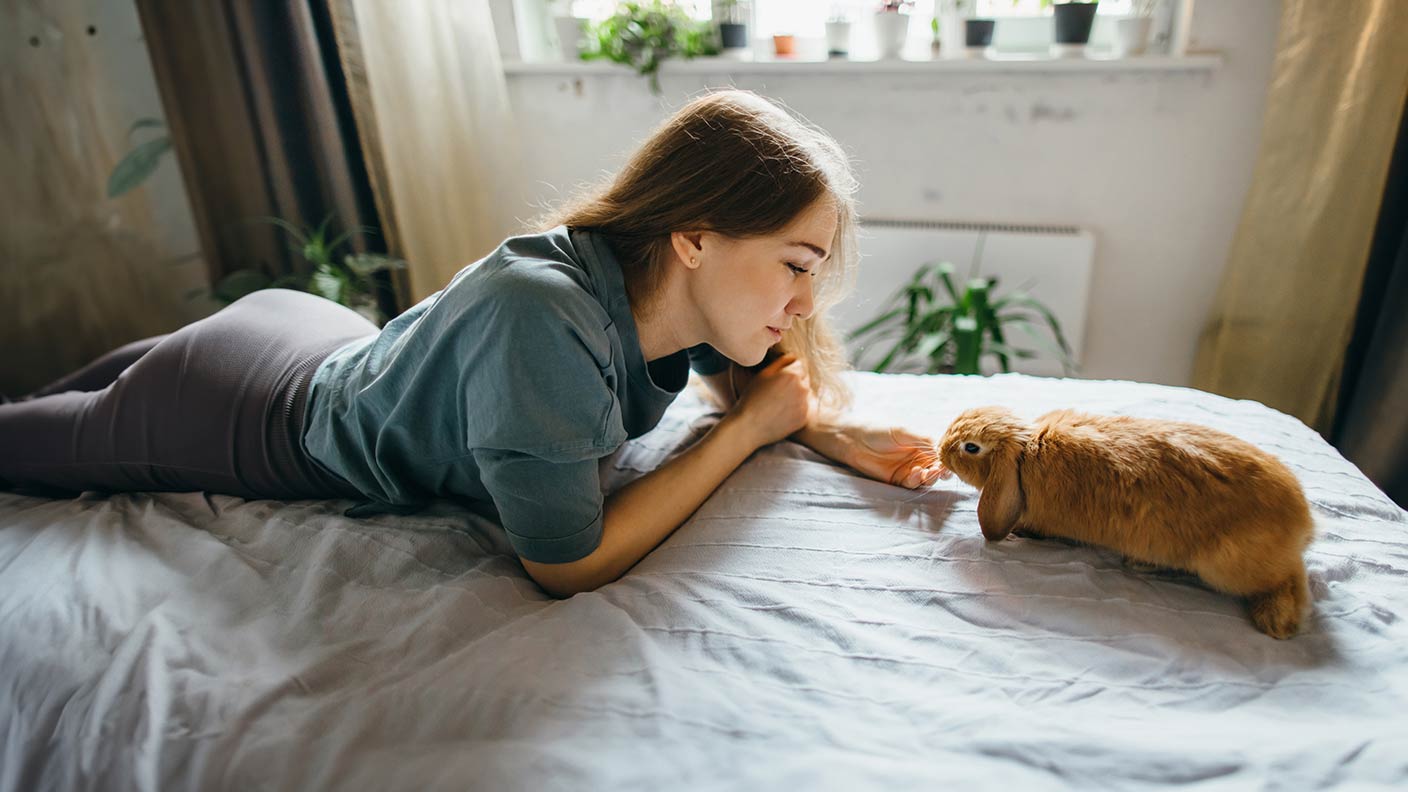Creating an indoor rabbit cage setup
While rabbits can live outdoors year-round, some owners choose to keep them inside. This might be temporary during the cold winter months, or a permanent fixture. House rabbits can live healthy and happy lives, provided they have the right setup. Keeping rabbits indoors can be a great idea – but first, there’s a few things you need to consider:
Cage or free-roaming
Whether you opt for cage or free roaming, your indoor rabbit setup should include a safe place for your rabbit to retreat to. It’s recommended you give them a large enclosure in a quiet part of the home, even if you let them out to roam a lot. That means you’ll need to find room for a hutch or pen and run area, with plenty of places for them to hide away and play when you’re not around to supervise.
Try to avoid placing the pen in a room with tiles or shiny flooring so your bunny isn’t slipping around. Enclosures are a good idea so that your rabbit can acclimate to being indoors too. Give them a day or two inside the pen so they can get used to the sounds and smells of the house before they go exploring.
Litter training
You might not think they’re up to it, but rabbits can be litter trained. They’re incredibly clean too – in the wild, rabbits are known to make sections dedicated to droppings and urine. This means they’ll adapt to using a “latrine” area. In the wild, they use these sections to mark their territory and stay safe from predators.
To litter train your rabbits, you’ll need to create an area away from their sleeping space for droppings. You could use a tray, placing some droppings there along with some used materials so your rabbit associates the area with going to the toilet.
Essentials you’ll need
If you want to make your rabbit’s life indoors as comfortable as possible, you’ll need some rabbit essentials. Here’s a list of items your bunny will want to get its paws on for the ideal indoor rabbit cage setup:
- Bedding
- Litter boxes
- Hay racks and hay
- Water bottles/bowls
- Toys
- Housing and hidey holes
- Rabbit proofing supplies
What to Feed Your Indoor Rabbit
Feeding your indoor rabbit isn’t overly different compared to an outdoor bunny. Keep them hopping along with the following:
- Fresh feeding hay and grass
- Leafy greens
- Rabbit pellets
- Fresh, clean water
- Root vegetables and fruit rarely, as a treat
Keeping your rabbit happy indoors
Toys and chews
These are some types of toys to keep rabbits entertained and their teeth healthy.
- Paper – it may be deceptively simple, but a bunny can have a great time with shredded newspapers, paper bags (sans handles) or non-glossy books.
- Parcels – wrap your rabbit’s favourite food up in some brown paper and let them unpackage it with their teeth for a tasty treat.
- Tunnels – wide tunnels can give your bunny a great play area. Ceramic, cardboard, fabric or plastic tunnels are all welcome.
- Hidey holes – whether it’s a cardboard box or something more playful, these toys can be great for rabbits to hide in. You can also put snacks and treats in areas like this as part of their daily diet.
- Toys – simple baby toys like rattles or stack cups can be good choices for rabbits as well as wicker baskets, flowerpots, scratch mats and hay-housing.
Exercise Needs
Rabbit giving you the run around? Rabbits need plenty of mental and physical stimulation to stay healthy and happy. Stop your rabbit from going hopping-mad, and give them the exercise and mental stimulation they need with the following:
- Interactive play areas – use toys and create a stimulating environment for your rabbit to play in.
- Roaming – give your rabbit space to roam around indoors in a safe, calm space beyond their pen.
- Company – rabbits are sociable and usually play better together. Giving them a playmate can help prevent loneliness.
- Outdoor play time – even when it’s cosier inside, your bunny needs some time outside. Try to let them play outside in a secure area where possible, even if only for half an hour a day . They’ll benefit from the sunshine and space – and enjoy the fresh grass if you have a lawn.
- Safety – try to make spaces that are safe and stress free. That means bunny-proofing wires and using plastic guards to avoid them chewing things they shouldn’t.
Social interaction
Bonding with your bunny gives you the fuzziest feeling. There’s nothing better than settling down for a good snuggle with a rabbit. But remember, they’re living creatures and they deserve to be treated with respect. Here are some tips for bonding with your rabbit to help you both get along.
- Don’t chase – if your bunny isn’t in the mood, that’s that. Try not to chase them as you could cause them stress.
- Introduce gradually – give your rabbit time to acclimatise to the indoor setting. They’ll find their feet in their own time.
- Look for signs of stress – if your bunny is excessively skittish, nervous, jumpy or aggressive then something could be stressing them out.
- Interact their way – rabbits are social but only on their terms. You should let them dictate if they want to engage with you.
- Supervise around children – from very young to teenage kids, make sure children know to be gentle and respectful towards your rabbit. Children could hurt them unintentionally, and rabbits have been known to bite when threatened.
Mental stimulation
Bunnies to love to hop around, explore and dig outdoors. That means you need some ways to prevent boredom if you’re keeping your rabbits inside. Here are some ways to enrich your rabbit’s space:
- Platforms – give your bunny a diverse space to play in, with all sorts of platforms to clamber over and discover. Things like log bridges are great too.
- Think simple – cardboard filled with hay can be just an enriching as an expensive toy from the pet shop.
- Switch things up – you can rotate or move toys around to keep things interesting. If you introduce a new toy or layout, keep an eye on your rabbit to ensure they don’t get frightened.
How to care for indoor rabbits
Rabbits are clean animals, but they need a spot of care now and then. Here are some things to consider when it comes to caring for your indoor rabbit.
Grooming
- Nail trimming – a rabbit’s nails can get long, especially if they’re kept indoors. Try to trim these once a month – to prevent scratch marks on your furniture and skin.
- Brushing – brush your rabbit’s fur at least twice a week, if not every day for longer haired breeds. If your rabbit is shedding, you may need to do this more often.
- Do not bathe – rabbits aren’t fond of water and will naturally clean themselves.
- Check the ears – while floppy eared rabbits are especially notorious for ear problems, it’s worth checking and cleaning most rabbits’ ears if there’s significant wax build up.
- Clean around the eyes – short-haired rabbits may need some attention around the eyes, but it’s a good habit to check most rabbits. You can use slightly damp cotton wool ball to carefully clean them.
Vet visits
Regular vet visits are needed for:
- Regular check-ups – general checks are a good idea just ensure there’s no issues lurking.
- Vaccines – it’s important vaccinate your rabbit against RHD1 and RHD2 as well as Myxomatosis.
- Spaying/neutering – this isn’t just about stopping your rabbit from breeding, there are some issues such as uterine cancer that can be prevented by spaying.
Ensure you’re covered for unexpected vet visits and costs, with Sainsbury’s Bank Rabbit Insurance.
Common health issues
Rabbits don’t have many hereditary illnesses but there are some common problems you might encounter. Here are some health issues and how to spot them:
- Bloat – bloat can be a potentially fatal condition. If your rabbit has a bloated stomach, a lost appetite, difficulty pooping, or the stomach is hard, you should visit a vet immediately .
- Dental issues – rabbits can be prone to dental problems. This can be due to diet, bad teeth alignment, physical trauma or genetic issues. If your rabbit struggles to eat, salivates a lot, doesn’t groom itself enough or has protruding front teeth, you should visit your vet to have the issue checked.
- GI Stasis – this condition is like bloat, but rabbits will stop eating over time. Many of the symptoms are similar to bloat and it is equally fatal if left unchecked.
- Uterine infections and cancer.
- Eye and ear infections.
If your bunny appears unwell, it’s important to take them to a vet who will be able to diagnose the issue. Rabbit insurance can help cover the cost of vet fees so you’re not left out of pocket.
We can’t cover pre-existing conditions with Sainsbury’s Bank Pet Insurance, but we can cover your rabbit from eight weeks old, so getting insurance when you get your new bunny can help, should you need it later down the line.
Cleaning products
Bunnies are clean animals, but your indoor rabbit might need a hand keeping their cage setup clean. Here are some must-haves for your bunny cleaning arsenal:
- White vinegar – mix one part vinegar to two parts water and use to clean their litter boxes and cage.
- Disinfectant – if don’t like the scent of cleaning vinegar, there are a variety of pet-safe, rabbit-friendly disinfectants and cleaning solutions.
- Dustpan and brush – accidents happen, so if you want to clean up stray straw and droppings, a dustpan and brush can keep things tidy.
Try to avoid using chemical cleaners, aerosols, and polishes where your bunny might roam.
While this general advice is handy, you can learn more about caring for different rabbit breeds.
Challenges of keeping rabbits indoors
Rabbits generally live outside, so moving them indoors can take some adapting. Here are a few things to watch out for:
- Destructive chewing – rabbits like to nibble, especially if they’re bored, lonely or stressed. If they’re acting out, it may be indicative of another problem.
- Litter training challenges – your bunny will need time to acclimatise to litter training and older rabbits may learn slower. You can drop toilet materials and droppings in the litter tray to help your bunny understand.
- Managing space – indoor rabbits still need a lot of space to move around with enough items to entertain them.
- Time commitment – rabbits don’t like being left alone. They need supervised playtime and should be left with something to entertain themselves if they’re going to be alone for more than a few hours.
- Exploring – rabbits like to explore and they’re deceptively agile. They can squeeze through small spaces and get to things you might think are out of reach. Rabbits should always be supervised in the home.
Frequently asked questions
Is it ok to keep rabbits indoors?
Yes, keeping your rabbit indoors is safe and your rabbit can adapt to life inside. It’s a great way to bond with your bunny and keep a closer eye on them. Rabbit proofing your home and finding space for their play area can make the transition easier.
Do rabbits smell if left indoors?
As long as their housing is regularly and properly cleaned, no. Rabbits are naturally clean animals – if you help them with the parts they can’t deal with like droppings and uneaten food.
Is a rabbit a good indoor pet?
As long as you have the space for them and a calm atmosphere in the home, then rabbits make great indoor pets. Do your best to rabbit proof the home and everything should be fine.

Browse our guides
Choose from our list of helpful guides and information

Browse our rabbit guides
How to care for your rabbit, common health problems and more

Rabbit breed guides
Find out how to keep your rabbit healthy and happy
Terms and conditions
Important information
* The discount is based on information related to you and the Sainsbury’s and Sainsbury’s Bank transactions linked to your Nectar account. For more information on how we use your data, go to sainsburysbank.co.uk/privacy
Sainsbury's Bank plc, Registered Office, 33 Charterhouse Street, London, EC1M 6HA (registered in England and Wales, no 3279730) is authorised by the Prudential Regulation Authority and regulated by the Financial Conduct Authority and the Prudential Regulation Authority (register no. 184514).
Sainsbury's Supermarkets Ltd is an appointed representative of Sainsbury's Bank plc. Sainsbury's Bank plc acts as an introducer to Pinnacle Insurance Ltd who is authorised by the Prudential Regulation Authority and regulated by the Financial Conduct Authority and the Prudential Regulation Authority (register number 110866). Registered office: 4th Floor, Limelight, Elstree Way, Borehamwood, Hertfordshire, WD6 1JH. Sainsbury’s Bank Pet Insurance is arranged, administered and underwritten by Pinnacle Insurance Ltd. Sainsbury's Bank plc and Pinnacle Insurance Ltd are not part of the same corporate group.
We do not provide personal recommendations to customers.
